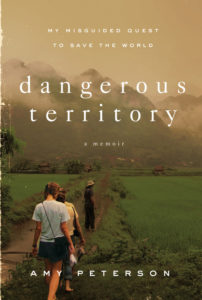I am not, nor have I ever been, a missionary. Not in the travel to far-off places and share the Gospel sense. Still, I have a bit of wanderlust and a desire to do important things. Which must be why I connected with Amy Peterson’s story in her spiritual memoir, Dangerous Territory: My Misguided Quest to Save the World. (To be clear, this is not just a book for missionaries or would-be missionaries or young people because I am none of those things!)
 Peterson’s account of her time teaching English in Southeast Asia and events that led to trouble in her host country, as well as her deconstruction of the faith she’d grown up with is relatable and engaging. It is not a hero’s story but a humble retelling of finding God again and learning that all service to Him, no matter where, no matter what, is important and part of the kingdom work of restoration. (Disclaimer: I received a copy of the book from the author. Review reflects my personal and honest opinion.)
Peterson’s account of her time teaching English in Southeast Asia and events that led to trouble in her host country, as well as her deconstruction of the faith she’d grown up with is relatable and engaging. It is not a hero’s story but a humble retelling of finding God again and learning that all service to Him, no matter where, no matter what, is important and part of the kingdom work of restoration. (Disclaimer: I received a copy of the book from the author. Review reflects my personal and honest opinion.)
That stories like this exist give me hope that future generations will be encouraged to live a spiritual life wherever they are or are called to, whether that is somewhere across the ocean or down the street from their childhood home. Peterson’s struggle to find meaning and purpose in staying instead of going is a much-needed story in a world that continues to value the big and bold steps of faith.
She writes early in the book about her expectations:
Sermons about lives full of dedication to God rarely made daily floor-sweeping an example of dedication. They seldom lauded people who responded to e-mails punctually and thoughtfully. They didn’t praise those who regularly attended conferences for professional development and stayed up-to-date in their fields.
I wanted an extraordinary life, flush with spiritual vitality and adventure, a life fully committed to God. I wanted to be the greatest.
We do a disservice to believers of all ages when we elevate certain expressions of spirituality above others (missionaries and pastors, for example). And Peterson comes to the realization through trials and silence that maybe she had it all wrong.
“What if God didn’t want me to be useful? Could I surrender to that? Was I willing to be useless for God?” (182)
That’s a question I’m sitting with personally. Maybe God doesn’t need me to do, do, do all the time. Maybe I can just “be” and that’s enough.
Her conclusions by the end of the book are ones I’m making as well. I’ll share more about that when I join the author’s blog link-up to celebrate the book’s launch.
Even though it’s applicable to anyone deconstructing their faith or who has ties to missions, I’d call this one a must-read for anyone new to missions or considering missions for longer than a short-term trip. It’s a realistic and honest look at what it’s truly like “on the field” and not the kinds of stories you typically hear from visiting missionaries during a church service.